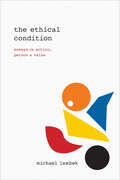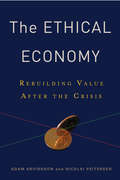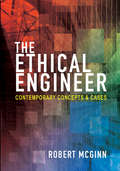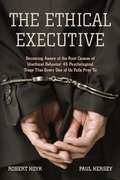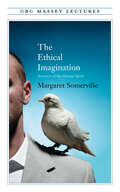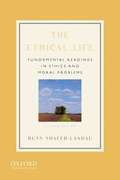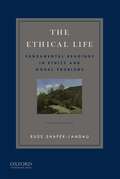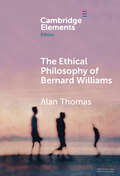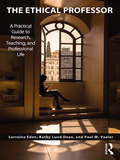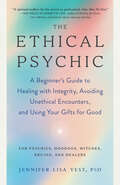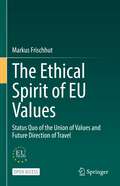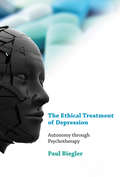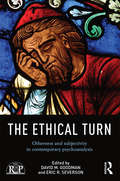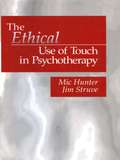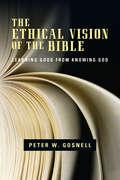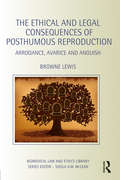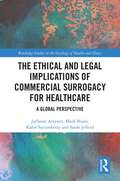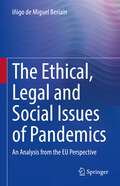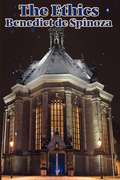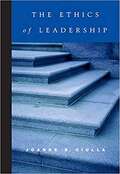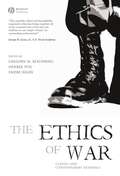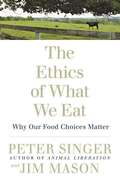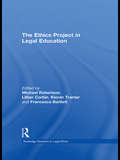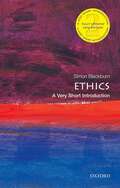- Table View
- List View
The Ethical Condition: Essays on Action, Person, and Value
by Michael LambekWritten over a thirty-year span, Michael Lambek's essays in this collection point with definitive force toward a single central truth: ethics is intrinsic to social life. As he shows through rich ethnographic accounts and multiple theoretical traditions, our human condition is at heart an ethical one--we may not always be good or just, but we are always subject to their criteria. Detailing Lambek's trajectory as one anthropologist thinking deeply throughout a career on the nature of ethical life, the essays accumulate into a vibrant demonstration of the relevance of ethics as a practice and its crucial importance to ethnography, social theory, and philosophy. Organized chronologically, the essays begin among Malagasy speakers on the island of Mayotte and in northwest Madagascar. Building from ethnographic accounts there, they synthesize Aristotelian notions of practical judgment and virtuous action with Wittgensteinian notions of the ordinariness of ethical life and the importance of language, everyday speech, and ritual in order to understand how ethics are lived. They illustrate the multiple ways in which ethics informs personhood, character, and practice; explore the centrality of judgment, action, and irony to ethical life; and consider the relation of virtue to value. The result is a fully fleshed-out picture of ethics as a deeply rooted aspect of the human experience.
The Ethical Economy: Rebuilding Value After the Crisis
by Adam Arvidsson Nicolai PeitersenA more ethical economic system is now possible, one that rectifies the crisis spots of our current downturn while balancing the injustices of extreme poverty and wealth. Adam Arvidsson and Nicolai Peitersen, a scholar and an entrepreneur, outline the shape such an economy might take, identifying its origins in innovations already existent in our production, valuation, and distribution systems.Much like nineteenth-century entrepreneurs, philosophers, bankers, artisans, and social organizers who planned a course for modern capitalism that was more economically efficient and ethically desirable, we now have a chance to construct new instruments, institutions, and infrastructure to reverse the trajectory of a quickly deteriorating economic environment. Considering a multitude of emerging phenomena, Arvidsson and Peitersen show wealth creation can be the result of a new kind of social production, and the motivation of continuous capital accumulation can exist in tandem with a new desire to maximize our social impact. Arvidsson and Peitersen argue that financial markets could become a central arena in which diverse ethical concerns are integrated into tangible economic valuations. They suggest that such a common standard has already emerged and that this process is linked to the spread of social media, making it possible to capture the sentiment of value to most people. They ultimately recommend how to build upon these developments to initiate a radical democratization of economic systems and the value decisions they generate.
The Ethical Engineer: Contemporary Concepts And Cases
by Robert McGinnAn exploration of the ethics of practical engineering through analyses of eighteen rich case studiesThe Ethical Engineer explores ethical issues that arise in engineering practice, from technology transfer to privacy protection to whistle-blowing. Presenting key ethics concepts and real-life examples of engineering work, Robert McGinn illuminates the ethical dimension of engineering practice and helps students and professionals determine engineers’ context-specific ethical responsibilities.McGinn highlights the “ethics gap” in contemporary engineering—the disconnect between the meager exposure to ethical issues in engineering education and the ethical challenges frequently faced by engineers. He elaborates four “fundamental ethical responsibilities of engineers” (FEREs) and uses them to shed light on the ethical dimensions of diverse case studies, including ones from emerging engineering fields. The cases range from the Union Carbide pesticide plant disaster in India to the Google Street View project. After examining the extent to which the actions of engineers in the cases align with the FEREs, McGinn recapitulates key ideas used in analyzing the cases and spells out the main lessons they suggest. He identifies technical, social, and personal factors that induce or press engineers to engage in misconduct and discusses organizational, legal, and individual resources available to those interested in ethically responsible engineering practice.Combining probing analysis and nuanced ethical evaluation of engineering conduct in its social and technical contexts, The Ethical Engineer will be invaluable to engineering students and professionals.Meets the need for engineering-related ethics studyElaborates four fundamental ethical responsibilities of engineersDiscusses diverse, global cases of ethical issues in established and emerging engineering fieldsIdentifies resources and options for ethically responsible engineering practiceProvides discussion questions for each case
The Ethical Executive
by Robert Hoyk Paul HerseyIn the socially responsible, conscience-focused marketplaces of today, the demand for more ethical business processes and actions is increasing. Enron, Worldcom and - most recently - individual rogue financial traders have all helped to shake the public's faith in business. Studies have shown that 60% of people don't trust business leaders to tell the truth, yet many companies don't even have a code of ethics - and if they do there is no guarantee it will be followed. The Ethical Executive provides guidelines for anyone in business who wants to do the right thing. It looks at the root causes of unethical beviour and describes 44 psychological traps that the unwitting executive can fall prey to. Using case studies from international business such as Johnson & Johnson and Worldcom, it describes how corporate culture can encourage unethical behaviour through slavish obedience to authority, the sidestepping of responsibility, all-encompassing self interest, the blame culture and a self-serving bias. The Ethical Executive will help you to become aware of these traps - so you can be more cautious, vigilant and then hopefully avoid them.
The Ethical Imagination: Journeys of the Human Spirit (The CBC Massey Lectures)
by Margaret SomervilleScience and technology force us to ask some of the most challenging and unprecedented ethical questions in the world today. These issues encompass what it means to be human, how we relate to others and our world, and how we find meaning in life. How we can find a shared ethics for an interdependent world? In her 2006 CBC Massey Lectures, ethicist and McGill University professor Margaret Somerville tackles some of the most contentious issues of our times, and proposes a brilliant new kind of ethical language and thought to help us navigate them.
The Ethical Life (2nd Edition)
by Russ Shafer-LandauA Compact Yet Thorough collection of readings in ethical theory and contemporary moral problems-at the best price
The Ethical Life (Fourth Edition): Fundamental Readings In Ethics And Contemporary Moral Problems
by Russ Shafer-LandauBrief yet thorough and affordably priced, The Ethical Life: Fundamental Readings in Ethics and Moral Problems, Fourth Edition, is ideal for courses in introductory ethics and contemporary moral problems. Featuring forty-two readings divided into four parts--The Good Life, Normative Ethics, Metaethics, and Moral Problems--it introduces students to ethical theory and a wide range of moral issues. The essays include selections from such historically influential philosophers as Aristotle, Hume, Kant, and Mill alongside work by contemporary philosophers like Philippa Foot, Robert Nozick, Peter Singer, and Judith Jarvis Thomson. Detailed reading introductions provide helpful contextual information. Designed as a companion reader to Russ Shafer-Landau's textbook, The Fundamentals of Ethics, Fourth Edition, this volume is also comprehensive enough to be used on its own.
The Ethical Philosophy of Bernard Williams (Elements in Ethics)
by Alan ThomasThis Element surveys the main claims of Bernard Williams's ethical philosophy. Topics include ethical scepticism, virtue, reasons for action, the critique of the Morality System, moral realism and the nature of theorising in ethics.
The Ethical Professor: A Practical Guide to Research, Teaching and Professional Life
by Lorraine Eden Kathy Lund Dean Paul M VaalerThe purpose of The Ethical Professor is to provide a road map to some of the ethical dilemmas that doctoral students and newer faculty members are likely to face as they enter a career in academia (the Academy). Academic career paths appear to be quite standard, transparent, and achievable with dedicated and hard work. Argued in this book, however, is that the road map to a successful academic career is not so easy. There are ethical pitfalls along the way, starting with entry into academia as a new PhD student. These ethical dilemmas remain equally opaque as faculty progress in their careers. The ethical pitfalls that plague each of the steps along the academic career path are often not visible to doctoral students and young faculty members; nor are they well prepared to spot them. Ethical issues are seldom discussed and little training is provided on how to spot and handle these potential road blocks to a successful career in the academy. Based on extant research and collective years of academic experience, The Ethical Professor seeks to shorten the learning curve around common ethical pitfalls and issues by defining them, sharing research and experiences about them, and offering a discussion framework for continued learning and reflection. This innovative new volume will be key reading for doctoral students and junior faculty members in social science departments in colleges and universities, as well as managers undertaking an MBA. Due to the increasing complexity of managing academic institutions, more seasoned professors, administrators, and college deans and presidents, will also benefit from the research presented here.
The Ethical Project
by Philip KitcherPrinciples of right and wrong guide the lives of almost all human beings, but we often see them as external to ourselves, outside our own control. In a revolutionary approach to the problems of moral philosophy, Philip Kitcher makes a provocative proposal: Instead of conceiving ethical commands as divine revelations or as the discoveries of brilliant thinkers, we should see our ethical practices as evolving over tens of thousands of years, as members of our species have worked out how to live together and prosper. Elaborating this radical new vision, Kitcher shows how the limited altruistic tendencies of our ancestors enabled a fragile social life, how our forebears learned to regulate their interactions with one another, and how human societies eventually grew into forms of previously unimaginable complexity. The most successful of the many millennia-old experiments in how to live, he contends, survive in our values today. Drawing on natural science, social science, and philosophy to develop an approach he calls "pragmatic naturalism," Kitcher reveals the power of an evolving ethics built around a few core principles-including justice and cooperation-but leaving room for a diversity of communities and modes of self-expression. Ethics emerges as a beautifully human phenomenon-permanently unfinished, collectively refined and distorted generation by generation. Our human values, Kitcher shows, can be understood not as a final system but as a project-the ethical project-in which our species has engaged for most of its history, and which has been central to who we are.
The Ethical Psychic: A Beginner's Guide to Healing with Integrity, Avoiding Unethical Encounters, and Using Your Gifts for Good
by Jennifer Lisa VestA 101 guide for psychics and energy workers to build an authentic, equitable, and culturally sensitive healing practice, written by Afro-Indigenous intuitive, scholar, and healer Dr. Jennifer Lisa Vest.Being an ethical psychic means being of service--and learning how to navigate the thorny issues and unique risks inherent to intuitive work. From knowing your boundaries and limitations--and respecting those of your clients--to resisting the temptation of the guru lifestyle, The Ethical Psychic offers 7 critical guiding principles for grounded, ethical practice. Intuitive, philosopher, and ethicist Dr. Jennifer Lisa Vest, PhD, explores why (and how) energy workers must be of service, authentic, and self-aware; learn from their mistakes; embody sensitivity to client needs; be humble; and listen to a higher source. With training in African American Hoodoo, Native American Sweatlodge, Jamaican Revivalism, Trinidadian Shango, Spiritualism, Reiki, Pranic Healing, and other traditions, Dr. Vest is uniquely positioned to address readers&’ most common and pressing questions, like: How do I avoid crossing boundaries? What if I&’m making things worse? What privacy considerations do I need to think about? How can I be financially ethical? How do I avoid appropriation? What do I need to know about working with spirits? A go-to-guide for any medium, spirit worker, psychic, or aspiring Reiki master, The Ethical Psychic helps readers become the grounded and effective healers they were born to be.
The Ethical Spirit of EU Values: Status Quo of the Union of Values and Future Direction of Travel
by Markus FrischhutThis open access book, summarising the research conducted at this Jean Monnet Chair, seeks to identify the ethical spirit of European Union (EU) values. EU integration began at the economic level; human rights were only added at a later stage. Finally, the Lisbon Treaty turned the EU into a ‘Union of values’ by enshrining certain concepts in Art 2 TEU. This provision can be seen as a hub linked to various other provisions of EU primary and secondary law. The values contained therein have, amongst others, been applied to two areas (digitalisation and non-financial reporting, partly in sports), and further specified in others (health and partly in sports). This book analyses the evolution of values (ratione temporis) and the questions of who is entitled and who is obliged (ratione personae). Besides the external perspective (ratione limitis; e.g., Brexit), it focuses on the composition of the EU’s common values (ratione materiae). As Art 2 TEU can be viewed as a hub, it is essential to focus on various relations, not only between values, but also between values and other provisions of EU law, as well as other concepts. Based on this description of the status quo, the book subsequently addresses a possible future direction, arguing for an additional narrative (trust), an additional value (environmental protection), and a more communitarian Union. In closing, apart from the classical commitment of the EU and the Member States to uphold the values of the EU, the book discusses the level of individuals and values as virtues. Various figures and tables complement this overview of the status quo of the Union of values and outline of its future direction.
The Ethical Treatment of Depression: Autonomy through Psychotherapy (Philosophical Psychopathology)
by Paul BieglerA philosopher argues there is an ethical imperative to provide psychotherapy to depressed patients because the insights gained from it promote autonomy.One in six people worldwide will experience depression over the course of a lifetime. Many who seek relief through the healthcare system are treated with antidepressant medication; in the United States, nearly 170 million prescriptions for antidepressants were written in 2005, resulting in more than $12 billion in sales. And yet despite the dominance of antidepressants in the marketplace and the consulting room, another treatment for depression has proven equally effective: psychotherapy—in particular, cognitive behavior therapy (CBT). Antidepressants can lift mood independent of a person's understanding of symptoms or stressors. By contrast, CBT teaches patients skills for dealing with distressing feelings, negative thoughts, and causal stressors. In The Ethical Treatment of Depression, Paul Biegler argues that the insights patients gain from the therapeutic process promote autonomy. He shows that depression is a disorder in which autonomy is routinely and extensively undermined and that physicians have a moral obligation to promote the autonomy of depressed patients. He concludes that medical practitioners have an ethical imperative to prescribe psychotherapy—CBT in particular—for depression. To make his case, Biegler draws on a wide philosophical literature relevant to autonomy and the emotions and makes a comprehensive survey of the latest research findings from the psychological sciences. Forcefully argued, densely researched, and engagingly written, the book issues a challenge to physicians who believe their duty of care to depressed patients is discharged by merely writing prescriptions for antidepressants.
The Ethical Turn: Otherness and Subjectivity in Contemporary Psychoanalysis (Relational Perspectives Book Series)
by Eric R. Severson David M. GoodmanLevinas (1969) claims that "morality is not a branch of philosophy, but first philosophy" and if he is right about this, might ethics also serve as a first psychology? This possibility is explored by the authors in this volume who seek to bring the "ethical turn" into the world of psychoanalysis. This phenomenologically rich and socially conscious ethics has taken centre stage in a variety of academic disciplines, inspired by the work of philosophers and theologians concerned with the moral fabric of subjectivity, human relationship, and socio-political life. At the heart of this movement is a reconsideration of the other person, and the dangers created when the question of the "Other" is subsumed by grander themes. The authors showcased here represent the exceptional work being done by both scholars and practitioners working at the crossroads between psychology and philosophy in order to rethink the foundations of their disciplines. The Ethical Turn: Otherness and subjectivity in contemporary psychoanalysis guides readers into the heart of this fresh and exciting movement and includes contributions from many leading thinkers, who provide fascinating new avenues for enriching our responses to suffering and understandings of human identity. It will be of use to psychoanalysts, professionals in psychology, postgraduate students, professors and other academics in the field.
The Ethical Use of Touch in Psychotherapy
by Jim Struve Michael G. HunterIs the bias against touch in psychotherapy justified? Is ethical touch an oxymoron? Can the recovery process be complete without healing touch? Mental health professionals are entrusted with the awesome responsibility of providing appropriate treatment for clients in a safe environment that nurtures trust, a necessary ingredient for optimum movement through the therapeutic process. Though treatment approaches vary, most modalities are verbally based and, in theory, exclude physical contact. Fearing that any form of touch would likely lead to sexual feelings or interaction, clinicians tend to shy away from the topic. In this book, however, Mic Hunter and Jim Struve skilfully demonstrate that touch - a most basic human need - is intrinsic to
The Ethical and Legal Consequences of Posthumous Reproduction: Arrogance, Avarice and Anguish (Biomedical Law and Ethics Library)
by Browne LewisPosthumous reproduction refers to the procedure that enables a child to be conceived using the gametes of a dead person. Advances in reproductive technology mean it is now possible to assist in creating a life after you die, and in recent years the number of women who have attempted to get pregnant using posthumous reproduction has increased. However, the law in many jurisdictions has not put regulations in place to deal with the ethical and legal consequences that arise as a result of posthumous reproduction. This is the first book to exclusively focus on posthumous reproduction. The book comprehensively explores the legal and ethical issues surrounding posthumous reproduction in a number of jurisdictions including the US, Israel, the UK and France. The book looks at a number of issues including: ascertaining the wishes of the dead and protecting the reproductive rights of men who have deposited frozen sperm in clinics prior to their deaths; cases involving people who want to acquire fresh sperm from deceased or incompetent men and determining who should have the right to accept the sperm; identifying the parents of the posthumously conceived child; and discussing the need to promote the best interests of the child. The book critically examines the current laws that are in place and proposes additional regulations and policies in order to effectively regulate posthumous reproduction.
The Ethical and Legal Implications of Commercial Surrogacy for Healthcare: A Global Perspective (Routledge Studies in the Sociology of Health and Illness)
by Mark Brady Jutharat Attawet Kabir Sattarshetty Sarah JeffordIn this groundbreaking work, the authors explore the intricate interplay between commercial surrogacy and the global healthcare system, challenging conventional views with fresh insights into ethical, legal, and medical dimensions.Delving into a rapidly evolving landscape, the book reveals how commercial surrogacy transcends economic transactions to question the very core of healthcare ethics. It scrutinises international legal frameworks and exposes the delicate balance between a surrogate's autonomy and the financial pressures that can undermine it. At the heart of the discussion is the pivotal role of healthcare providers, who navigate complex ethical dilemmas while upholding the rights and well-being of surrogates, intended parents, and children. Through incisive analysis and compelling case studies, this book argues for the urgent need for robust safeguards, comprehensive guidelines, and specialised training to equip professionals for the challenges of modern surrogacy practices.This engaging narrative not only maps the evolving dynamics of commercial surrogacy but also calls for a sustainable, ethical future where healthcare remains a cornerstone of the surrogacy journey. Essential reading for researchers, advanced students, healthcare professionals, and policymakers alike, this book offers a holistic and provocative examination of an issue at the crossroads of ethics, law, and medicine.
The Ethical, Legal and Social Issues of Pandemics: An Analysis from the EU Perspective
by Iñigo de Miguel BeriainThis book proposes an ethical and legal framework to improve the responses to social issues related not only to the current SARS-CoV-2 pandemic, but also to future pandemics. Its contents cover the issues that are likely to be most controversial in any public health crisis. It starts by discussing non-pharmacological measures, such as the appropriateness of confinement, how to control compliance with public health measures and the ethical, legal and social acceptability of health certificates. Then it turns to issues related to the production, distribution and administration of vaccines, with a particular focus on the design and implementation of vaccination policies. Finally, it analyses the most appropriate criteria to develop a triage, when the situation brings us to this terrible scenario. The analyses presented in this book are based on the ethical and legal frameworks, as well as the social context, of the European Union, and aims to address the main dilemmas faced by any liberal democracy dealing with a pandemic: how to reconcile the defense against a public health crisis together with a respect for fundamental rights and freedoms. The European legal systems have developed a number of conceptual tools designed to ensure that there is no room for arbitrariness in the restrictions introduced by the political power in emergency situations, and this book builds upon these tools. The Ethical, Legal and Social Issues of Pandemics: An Analysis from the EU Perspective is a predominantly practice-oriented book, which will help policy makers to adopt policies that effectively combine public health needs with individual rights and freedoms. It will also help health care givers to understand better the ethical and legal issues involved in their work and citizens, in general, to participate in public decision making in an informed manner. Finally, it will help to design tools that faithfully comply with existing fundamental rights standards.
The Ethics
by Benedict De SpinozaBenedict de Spinoza's writings laid the groundwork for the 18th century Enlightenment and for modern Biblical criticism. By virtue of his magnum opus, The Ethics, Spinoza is considered one of Western philosophy's definitive ethicists.
The Ethics Of Leadership
by Joanne B. CiullaThe focus of ETHICS OF LEADERSHIP is the ethical challenges that are distinctive to leaders and leadership. Organized around themes such as power and the public and private morality of leaders, the book explores the ethical issues of leadership in a variety of contexts including, business, NGOs, and government. It integrates material on ethics and leadership from the great Eastern and Western philosophers with leadership literature and case studies. This multi-disciplinary approach helps philosophers and leadership scholars present a fully integrated view of the subject.
The Ethics Of War: Classic And Contemporary Readings
by Henrik Syse Gregory Reichberg Endre BegbyThe Ethics of War is an indispensable collection of essays addressing issues both timely and age-old about the nature and ethics of war. Features essays by great thinkers from ancient times through to the present day, among them Plato, Augustine, Aquinas, Machiavelli, Grotius, Kant, Russell, and Walzer Examines timely questions such as: When is recourse to arms morally justifiable? What moral constraints should apply to military conduct? How can a lasting peace be achieved? Will appeal to a broad range of readers interested in morality and ethics in war time Includes informative introductions and helpful marginal notes by editors
The Ethics Of What We Eat: Why Our Food Choices Matter
by Peter Singer Jim MasonPeter Singer, the groundbreaking ethicist whom The New Yorker calls the most influential philosopher alive teams up again with Jim Mason, his coauthor on the acclaimed Animal Factories, to set their critical sights on the food we buy and eat: where it comes from, how it is produced, and whether it was raised humanely. The Ethics of What We Eat explores the impact our food choices have on humans, animals, and the environment. Recognizing that not all of us will become vegetarians, Singer and Mason offer ways to make healthful, humane food choices. As they point out: You can be ethical without being fanatical.
The Ethics Project in Legal Education (Routledge Research in Legal Ethics)
by Michael RobertsonThe contributions in this volume suggest that "the ethics project in legal education" is increasingly an international one. Even though the strength of commitment by both the profession and the legal academy to "ethics learning" within law schools varies, two fundamental questions confront all who work in this area. First, what is it that we want our students to learn (or, perhaps, in what manner do we want our students to develop) from the teaching of "legal ethics"? Second, how can we create a learning environment that will encourage the nature and quality of learning we think is important? All the contributors to this volume take a strong stand on the importance of ethical legal practice and the role of law schools in developing students’ capacities in this area. They share a belief in the essential need to encourage law students to engage with the moral dimensions of legal practice. The questions that these scholars grapple with are therefore not of the "should we be teaching this?" variety, but "how might we best to go about doing this, so that our efforts within law schools really make some difference?" Each of the chapters in this volume adds uniquely to our understanding of these matters.
The Ethics Toolkit: A Compendium Of Ethical Concepts And Methods
by Julian Baggini Peter S. FoslThe Ethics Toolkit provides an accessible and engaging compendium of concepts, theories, and strategies that encourage students and advanced readers to think critically about ethics so that they can engage intelligently in ethical study, thought, and debate. Written by the authors of the popular The Philosophers' Toolkit (Blackwell, 2001); Baggini is also a renowned print and broadcast journalist, and a prolific author of popular philosophy books Uses clear and accessible language appropriate for use both inside and beyond the classroom Enlivened through the use of real-world and hypothetical examples Cross-referencing of entries helps to connect and contrast ideas Features lists of prominent ethics organizations and useful websites Encourages readers to think critically about ethics and teaches them how to engage intelligently in ethical study, thought, and debate
